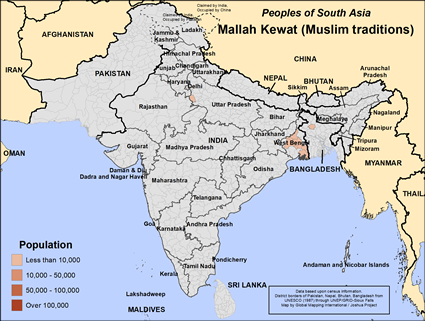The Mallah usually go by the name of Nishad, which refers to a character from the Hindu myth the Ramayana. Nishad was a boatman in Prayag (Allahabad UP) who ferried Ram, Sita and Laskman across the river. From this tale, the Nishad take pride and consider their occupation as boatmen along the holy Ganges River carrying Hindu devotees as a high calling or holy occupation. They take pride in their heritage, even though they are considered a backward caste. They live along the major waterways of Uttar Pradesh, Bihar, Madhya Pradesh and West Bengal.
There are some Muslim Mallah communities, but most are Hindu. Within these two religious communities there are subgroups. One subgroup that can be either Muslim or Hindu is the Kewat.
Muslim Kewat Mallah are poor and mostly illiterate. They are involved in boating and some fishing and sometimes in farming.
There are both Hindus and Sunni Muslims among the Kewat Mallah. Sunni Muslims believe that the supreme God, Allah, spoke through his prophet, Mohammed, and taught mankind how to live a righteous life through the Koran and the Hadith. To live a righteous life, you must utter the Shahada (a statement of faith), pray five times a day facing Mecca, fast from sunup to sundown during the month of Ramadan, give alms to the poor, and make a pilgrimage to Mecca if you have the means. Muslims are prohibited from drinking alcohol, eating pork, gambling, stealing, slandering and making idols. They gather for corporate prayer on Friday afternoons at a mosque, their place of worship.
The two main holidays for Sunni Muslims are Eid al Fitr, the breaking of the monthly fast and Eid al Adha, the celebration of Abraham's willingness to sacrifice his son to Allah.
Sunni religious practices are staid and simple. They believe that Allah has pre-determined our fates; they minimize free will.
In most of the Muslim world, people depend on the spirit world for their daily needs since they regard Allah as too distant. Allah may determine their eternal salvation, but the spirits determine how well we live in our daily lives. For that reason, they must appease the spirits. They often use charms and amulets to help them with spiritual forces.
Like most poor communities in India, the Muslim Kewats need better educational opportunities. They usually lack adequate medical facilities.
Pray for the Lord to send dreams and visions of the glorious Christ to Muslim Mallah leaders.
Pray that many Muslim Mallahs will have the spiritual hunger it takes to embrace Christ no matter what the cost.
Pray for Mallah disciples to make more disciples.
Pray for loving workers to go to every Mallah subgroup.
Scripture Prayers for the Mallah Kewat (Muslim traditions) in India.
https://en.wikipedia.org/wiki/Kewat
https://en.wikipedia.org/wiki/Mallaah
| Profile Source: Joshua Project |











